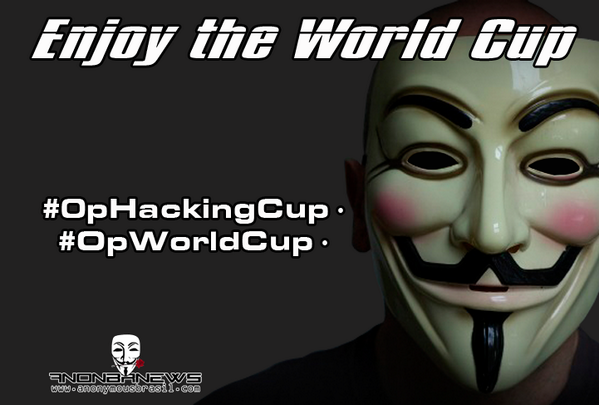Brazilian Hackers Persist with Operation World Cup

Brazilian cyber activists have combined efforts under various divisions of the Anonymous hacking collective in protest of the 2014 FIFA World Cup Tournament. The hacking campaign, “Operation World Cup,” also referred to as “Operation Hacking Cup” or “OpMundial2014,” addresses various issues surrounding the effects of the tournament on Brazilians in a grass-roots, decentralized operation.
Thus far, Operation World Cup hackers have typically used Pastebin.com pages to display stolen information, which they promote through Anonymous or Anonymous-affiliated social media accounts—the most common of which being Twitter. Leaked content has typically fallen along the lines of alleged passwords, usernames, addresses, and other personal information of the websites’ users.
These hackers have targeted both government and non-government websites. On June 15, 2014 alone, the websites of the Brazilian Socialist Party and the power utility company Eletrobras. The attack on the Brazilian Socialist party was promoted on Twitter by user “d0xeSH,” who provided a Pastebin link to a list, titled “[Leak] DB Partido Socialista Brasileiro by d0xe,” containing the alleged information of 441 individuals affiliated with the political party on.
The attack on Brazil’s Central Electric Company Eletrobras (eln.gov.br) that same day allegedly resulted in the leak of over 3,400 accounts consisting of email addresses, clear text passwords, full names and telephone numbers.
On the following day, the website of the Federal Police of Brazil was attacked. User “AnonBRNews,” the Twitter account Anonymous Brasil, posted a link to a document containing thirteen account credentials with clear text passwords.
Anonymous-linked Twitter accounts also began dispersing data from attacks on the websites of Brazil’s Government of the Federal District and the Foundation House of Rui Barbosa on June 12, 2014. The first attack, executed on the Foundation House of Barbosa one day prior, was released on Pastebin.com and titled “Copa 2014 gov Anonymous #OperationGreenRights #OpMundial2014.” The leak allegedly contained eleven account credentials consisting of user names and hashed passwords.
The attack on the Government of the Federal District’s website resulted in the alleged breach of two databases was also published on Pastebin.com on June 12, 2014 and promoted by Twitter user “OpGreenRights,” an anonymous-linked username associated with Operation World Cup. The release, titled “Copa 2014 gov Anonymous #OperationGreenRights #OpMundial2014,” contained an alleged list of 43 names, emails, usernames, and encrypted passwords.
Hackers involved in the Operation World Cup campaign have also been simultaneously attacking numerous targets and promoting the stolen data in large assemblages. On June 11, 2014, user “ANONBRNEWS” published a Pastebin.com release titled “#OpHackingCup - Status Update – Anonymous.” The release contained alleged data from seventeen websites, including that of the 2014 FIFA World Cup (worldcup2014.gov.br) along with the Department of Justice and Consumer Citizenship (procon.sp.gov.br) and the Brazilian Intelligence System (abin.gov.br).
Operation World Cup hackers have made sure to accompany statements with their attacks. Anonymous published a video on June 11, 2014 in protest of the 2014 FIFA World Cup in which it demanded the end of corruption and violence against demonstrators in Brazil. The one and half minute video, posted on Vimeo, served as a press release for the OpMundial2014 campaign and was published by “AnonymousVideo.” It claimed the Brazilian Government has “created a system which ensures the poor remain poor, and the wealthy remain wealthy.” The video ends with a call for Brazilians to “stand together and united to fight against this oppression.”

Another video was posted on You Tube by user “Anonymous Brasil” on June 3, 2014. The four minute video, titled “#OpHackingCup – Let The Games Begin,” claimed that the construction costs of the stadiums and buildings for the 2014 FIFA Tournament were poorly projected and, furthermore, that such expenditures should have been made on improving the living conditions of Brazilians. The video ends with a promise to “show to everyone how fake is and always was this Brazilian government and FIFA.” A Portuguese version and a transcript for the English version were also provided.